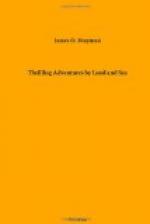In this dreadful extremity, and while the half-famished seamen were at night squatting in sullen dejection around their fires, a large lot of sea-birds, allured by the flames, rushed into the midst of them, and were greedily laid hold of as fast as they could be seized. For several nights in succession, similar flocks came in; and, by multiplying their fires, a considerable supply was secured. These visits, however, ceased at length, and the wretched party were exposed again to the most severe privation. When their stock of wild fowl had been exhausted for more than two days, each began to fear they were now approaching that sad point of necessity, when, between death and casting lots who should be sacrificed to serve for food for the rest, no alternative remained. While horror at the bare contemplation of an extremity so repulsive occupied the thoughts of all, the horizon was observed to be suddenly obscured, and presently clouds of penguins alighted on the island. The low grounds were actually covered; and before the evening was dark, the sand could not be seen for the number of eggs, which, like a sheet of snow, lay on the surface of the earth. The penguins continued on the island four or five days, when, as if by signal, the whole took their flight, and were never seen again. A few were killed, but the flesh was so extremely rank and nauseous that it could not be eaten. The eggs were collected and dressed in all manner of ways, and supplied abundance of food for upward of three weeks. At the expiration of that period, famine once more seemed inevitable; the third morning began to dawn upon the unfortunate company after their stock of eggs were exhausted; they had now been without food for more than forty hours, and were fainting and dejected; when, as though this desolate rock were really a land of miracles, a man came running up to the encampment with the unexpected and joyful tidings that “millions of sea-cows had come on shore.” The crew climbed over the ledge of rocks that flanked their tents, and the sight of a shoal of manatees immediately beneath them, gladdened their hearts. These came in with the flood, and were left in the puddles between the broken rocks of the cove. This supply continued for two or three weeks. The flesh was mere blubber, and quite unfit for food, for not a man could retain it on his stomach; but the liver was excellent, and on this they subsisted. In the meantime, the carpenter with his gang had constructed a boat, and four of the men had adventured in her for Tristan d’Acunha,




